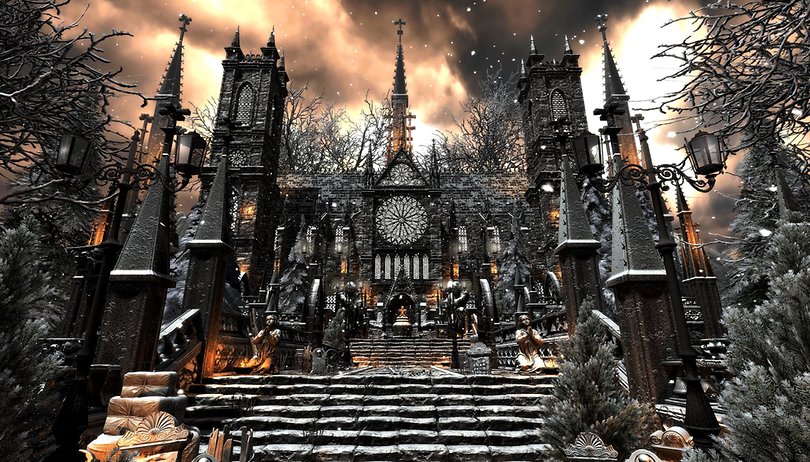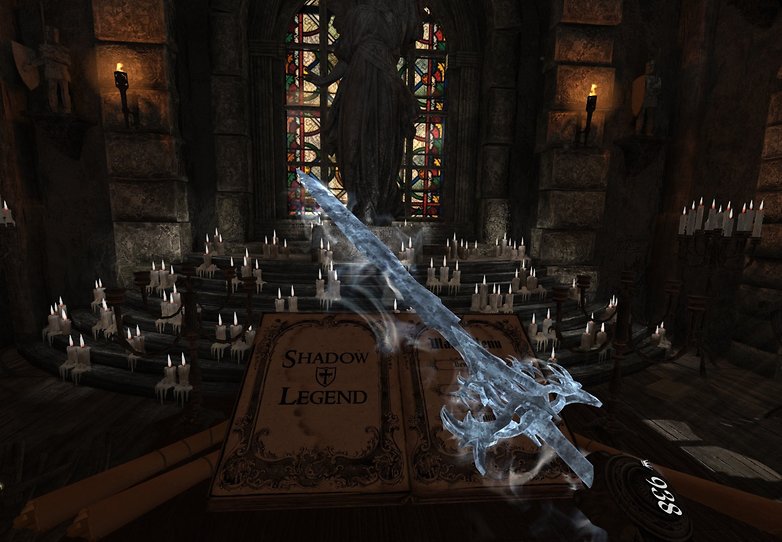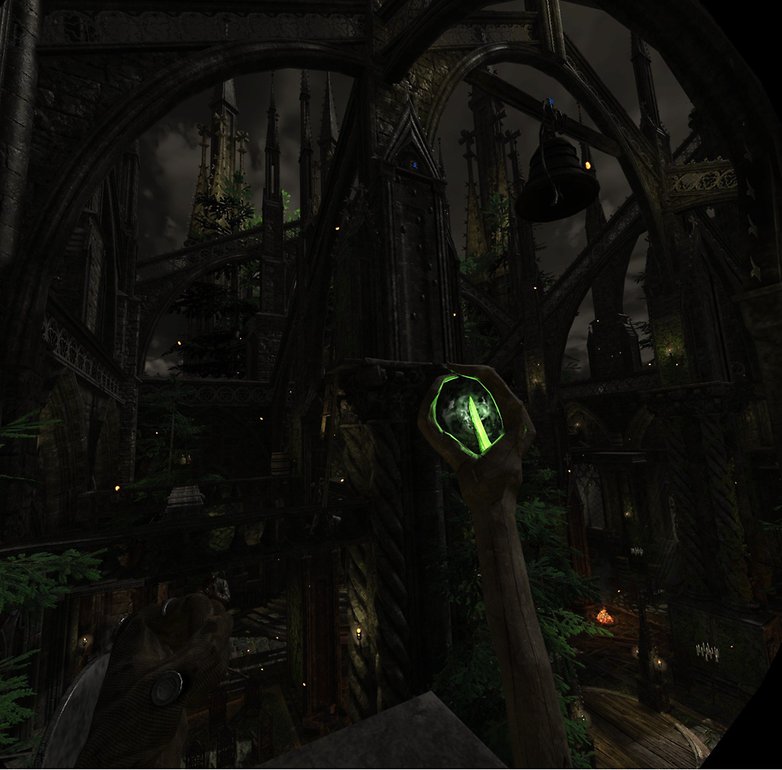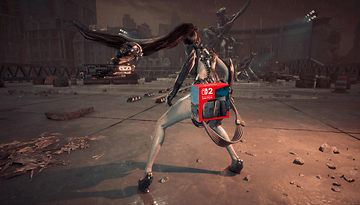Shadow Legend is an RPG quest for VR's Holy Grail


Shadow Legend VR, a new roleplaying game that just launched for Oculus Rift, HTC Vive and Windows Mixed Reality, could well be the most immersive VR experience yet, with natural feeling controls and grim gothic environments. I took up sword and torch against the darkness to see what kind of adventures await new players.
The fantasy RPG has a special place in the development of VR. Gathered around the clatter of dice on the tabletop, spending hours and hours in games like Baldur's Gate, The Witcher 3, or Skyrim, or laboriously stitching and forging their costumes and crafting personas for the next big LARP event, roleplayers work hard for that feeling of immersion - to be inside the realms of sword and sorcery as much as possible.
Virtual reality offers a tantalizing possibility for all the would-be elves and barbarians of the world, but so far the one VR RPG to rule them all still hasn't been found. Skyrim VR is great, and popular, but the VR elements of it are underdeveloped and the game controls rather awkwardly. What's needed is a roleplaying game designed for VR from the ground up, and right from the get-go. With Shadow Legend, you can tell the game is taking full advantage of the medium. For your information, I played it on the Samsung Odyssey+ WMR headset.
This RPG has all the right moves
This game eschews the usual RPG starting point of being a poor young orphan from a nowhere village, and puts you in the sabatons of a knight grandmaster, head honcho of a Templar-style military order whose world is threatened by an evil god. Your peaceful starting area serves as a kind of showcase for what you can do just using your own natural movements - and that's a lot.
It's the immersive controls that really make this game special - everything is done as much as possible through natural body movements. The first level is a kind of playground of little interactions to help you get used to doing this - you can pick up carrots to feed a horse, practice reaching for arrows and nocking your bow at a shooting range, climb ladders, sharpen your sword on a grindstone and even play fetch with a cute dog.
These fun little details, like moving a pipe to your face and seeing the smoke come out, swigging beer until your vision blurs, or tossing a steak over a bonfire, really make the whole experience come to life. In later levels, several puzzles will present themselves that will need some quick reactions, precise aiming and careful hand movements.
Locomotion can be done with the assist of the thumbsticks to turn and move when you can't walk anymore, or via teleportation. But aside from your body movements, Shadow Legend also has voice control, so dialogue with NPCs, or the answer to a riddle, for example, can be spoken aloud. Personally, I found the dialogue choices somewhat overlong and a little cheesy sounding for me to read aloud all the way though - there's no chatbot style AI here, you need to read the pre-written responses. However, it's still an extra level of immersion for those who want it.
In-game, you see your two hands, each with a number - your left forearm tracks your health, the right your wealth. You can have a sword sheathed at your side, a magic torch on the other, and a missile weapon is carried on your back, accessed by reaching behind you. As for the rest, your inventory is handled ingeniously - no annoying navigating through windows and scrolling through lists. Instead, you carry an chest on your belt which expands full size when you access your inventory, and you pluck items from the chest when you want to use them.
Bartering and selling items, often a chore in RPGs, is a joy here. It felt really fun for me to pluck items from my inventory chest, toss a bunch of gems in front of the storekeeper, and arrogantly demand an extravagant sum, haggling my way down to a agreement. The items on offer are usually lying around for you to pick up and try before you buy.
Knight and magic
Even though there are no character classes to choose from, our Grandmaster picks up enough different weapons along the way to give you a variety approaches to combat. There are plenty of swords, some of which have different effects, such as an ice sword that freezes enemies in place (a personal favorite) or a flaming katana that burns for extra damage. There also are different missile weapons like a crossbow or a hand cannon. Though wannabe wizards have some more magic-focused options on the VR market, Shadow Legend also lets you get your sorcery on with magic staves that shoot green flame or lightning. They are charged by gripping your off-hand to summon magic power.

The combat itself isn't too tricky, but it avoids the dreaded 'point your sword forward and wiggle around' method that can make fighting in some VR RPGs so ridiculous. Melee combat requires you to parry your enemies attack and look for openings, and you can do more damage with more vigorous swings. Enemies close to death have highlighted weak spots where you can strike for a satisfying dismemberment. Watch out...even an undead enemy with no arms left will try to kick you!
You can't just hack and slash mindlessly, however. In fact, the game's comprehensive physics can be used against your enemies, so it's possible to knock arrows out of the sky, or even lob bombs and projectiles back onto the monsters by swatting them at the correct angle, baseball-style.
The general feel of the weapons and combat as well as the level design took me back to the my old-school gaming days playing fantasy FPS games Heretic and Hexen. The battles in Shadow Legend don't really have the depth of Blade and Sorcery, VR's fantasy murder simulator par execellence, but the latter is just a combat arena, whereas Shadow Legend has one of the better VR swordplay systems implemented in an actual story-driven game.
Gorgeously gothic
Shadow Legend doesn't wow with hi-fidelity visuals, but still manages to be a feast for the eyes thanks to the attention to detail and consistency of the art direction. The game just oozes atmosphere from all corners.You can tell that real-world late medieval architecture was studied very closely!

The over-the-top gothic architecture looms around you, giving a suitably sinister feel, especially in the lands of the dead, to which you journey to battle the forces of evil. The ambient sounds and bombastic soundtrack do a good job of making you feel like you are in a living world, and always on edge in enemy territory.
A fast fantastic trip that leaves you wanting more
Shadow Legend offers fantastic fantasy immersion, but within its limits, and it's important to know those limits so as not to confuse it with a different kind of game. This isn't an open world adventure like Skyrim or the Witcher 3. Each area in the game is relatively small, and once you beat the enemies and solve the puzzles, you move on to the next stage without returning. It's an enjoyable, linear adventure that can be beaten in around 6 hours. When you consider the attention to detail that's gone into every single set-piece level by a 2-person team on an indie budget, that's not bad at all.
Now, you can extend your play time in Shadow Legend as much as possible if you want to collect every piece of treasure and power-up in the game, but that doesn't necessarily mean more fun.
If I have a particular gripe with Shadow Legend's design, it's that the power-ups that can be collected in each game world often require you to do odd bits of platforming. You need to get to hard to reach places in levels, where, for example, gold chalices are perched on a cathedral balcony; or you starting climbing up the roof rafters of your own castle, monkeying around the ceilings to grab that elusive power-up rune. None of the NPCs think to comment on this weird behavior, but maybe they're scared to call out the boss?
Aside from this platforming being very game-y and immersion-breaking in an otherwise very immersive game, it also makes for tricky maneuvering that ended up turning my stomach as the dreaded VR sickness set in. It's a shame, because there already are puzzles to access special items that use the environment in a more realistic way. The precision platform element feels like fake difficulty that prolongs the game's length, but without giving you more time with what actually makes Shadow Legend fun.
Despite this, I still heartily recommend Shadow Legend to any fantasy RPG fans with a VR headset. It costs $25 / £20 pounds on Steam and delivers a solid indie VR game for the price, with many unique elements. You may find yourself wishing for Shadow Legend's level of realistic interactivity in a larger, Elder Scrolls-type world, and that's because it feels so good to experience it in the first place.
I stepped into Shadow Legend searching for the Holy Grail: that Baldur's Gate or Morrowind landmark for VR RPGs. It's still somewhat out of reach, but as I drew my blade, mixed my potions, paddled my boat and much more during my adventure, it always felt like something great was just at the tip of my fingers.
Have you tried Shadow Legend or other VR RPGs? What do you think about them?



















